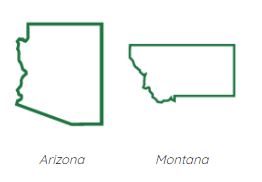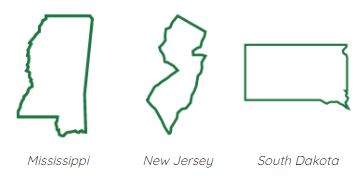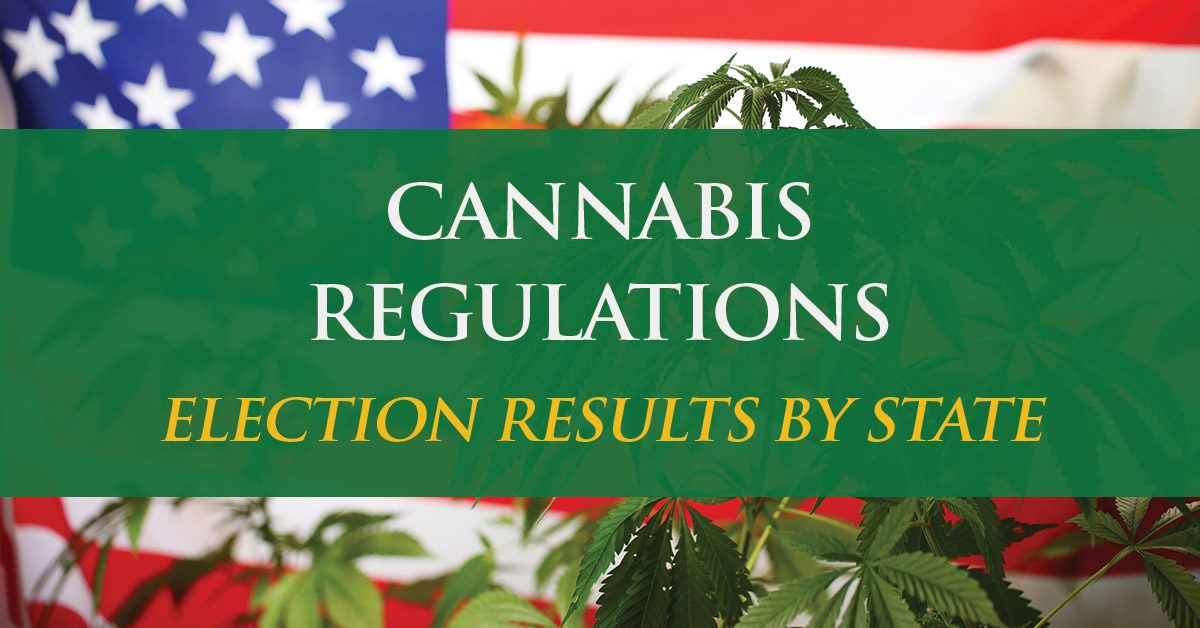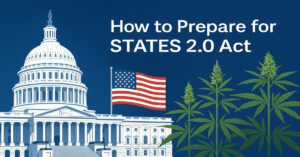In a historic election for cannabis, five different states voted to legalize cannabis!
In this special edition of our ongoing Cannabis Regulation Watch, we will break down the results of cannabis legalization efforts in this year’s historic election. We will be reviewing the results from state proposals in Arizona, Mississippi, Montana, New Jersey, and South Dakota.

Read on for the most up to date election results, and an explanation for what the rules and regulations will be in these newly cannabis friendly states.

This report was prepared by Mitch Kreamer, Market Research Analyst at Cannabis Real Estate Consultants. Reach out with questions, our dedicated compliance team and expert real estate agents will help you take advantage of these newly open markets!
Did you know you can hire us to develop predictive analysis and custom maps? – Select any region you are pursuing and have a huge leg up on your competitors! The CREC Research Team can create custom maps for any municipality using the CREC Portal and provide the due diligence required for creating a complete picture of a region.
Contact CREC Team about ordering your custom regulation maps!
Statewide Proposal Results for Cannabis Legalization
The cannabis industry was successful throughout the United States on Election Day!
The hodge podge of state cannabis legalization continued on election day, with all pending initiatives passing, but each of them meaning something different for the industry and the consumers that support the industry.
It is now estimated that the cannabis industry is presently in excess of $12 billion in retail sales with $9 billion of additional growth expected in the next 24 months as new states come online and existing legal states expand operations.
The following is a quick summary:
- Arizona – expanded its medicinal only industry to now include recreational with a 16% excise tax on all retail sales.
- Mississippi – legalized medicinal use, while recreational remains illegal. The approved ballot measure identified 20 different medical conditions and capped patient possession to 2.5 ounces of flower at one time.
- Montana – approved recreational use while capping possession to one ounce of flower or 8 grams of concentrate.
- New Jersey – after the state legislature failed to approve legalization, voters approved recreational in all vertical categories including cultivation, processing and retail.
- South Dakota – Voters in South Dakota approved an amendment to their state constitution legalizing recreational cannabis and the state legislature has until April 1, 2021 to pass laws supporting this election. Local jurisdictions are provided with the ability to continue to prohibit cannabis within their city/county.
Read the details of each state’s regulation updates below:
Arizona – Proposition 207 Marijuana Legalization Initiative
 Proposition 207 legalizes recreational cannabis possession and use for adults over the age of twenty-one in Arizona. Individuals will be allowed to possess up to one ounce of cannabis, up to five ounces of cannabis concentrate and are permitted to grow up to six marijuana plants in their residences, as long as the plants are within a lockable enclosed area and beyond public view. Local governments will have the power to decide whether to allow cannabis businesses in their cities, with an option to ban commercial uses outright in the city as well as establishing local regulation, zoning, and licensing rules.
Proposition 207 legalizes recreational cannabis possession and use for adults over the age of twenty-one in Arizona. Individuals will be allowed to possess up to one ounce of cannabis, up to five ounces of cannabis concentrate and are permitted to grow up to six marijuana plants in their residences, as long as the plants are within a lockable enclosed area and beyond public view. Local governments will have the power to decide whether to allow cannabis businesses in their cities, with an option to ban commercial uses outright in the city as well as establishing local regulation, zoning, and licensing rules.
The Arizona Department of Health Services will be responsible for developing a set of rules and regulations for commercial uses, including the licensing of marijuana retail stores, cultivation facilities, and production facilities. Those hoping for quick access to delivery cannabis will have to wait a little longer, as Proposition 207 requires that the DHS wait until at least January 1st, 2023 to regulate and permit delivery, with a final deadline to establish a program by January 1st, 2025.
DHS will be required to restrict the early access application period to existing nonprofit medical marijuana dispensaries, which would be eligible to hold both nonprofit medical marijuana and for-profit marijuana licenses, as well as potential marijuana businesses within counties that have one or zero nonprofit dispensaries. This early application period will be open between January 19th, 2021 and March 9th, 2021. After the early access period, the department will make remaining available licenses via a random selection process that will be publicized at least sixty days prior to the beginning of the selection.
The Department of Health Services will be limited to issuing no more than two marijuana establishment licenses for every county without a nonprofit medical dispensary, and one license per county with a registered nonprofit medical dispensary.
Proposition 207 also aims to assist low-income and minority communities by establishing a Social Equity Ownership Program (SEOP), which would reserve cannabis licenses for applicants whose owners are “from communities disproportionately impacted by the enforcement of previous marijuana laws.” Anyone convicted of certain marijuana-related crimes related to possession, consumption, cultivation, and transportation will be able to petition for the expungement of their criminal record starting on July 12, 2021.
Proposed Tax Rates: Proposition 207 would place a 16 percent tax on marijuana sales, in addition to the existing transaction privilege tax and use tax, and split the proceeds between supporting local community colleges, municipal police, sheriff, and fire departments; fire districts; the state’s Highway User Revenue Fund, and a new Justice Reinvestment Fund.
Results: Proposition 207 Passes 59.85% to 40.15%
Links: Click here for the full text of ballot initiative 207.
Mississippi Ballot Measure 1, Initiative 65 and Alternative 65A, Medical Marijuana Amendment
 Mississippi voters had two separate medical marijuana ballot initiatives to consider this election, with both initiative 65 and Alternative 65A making medical marijuana programs available for patients suffering from debilitating medical conditions.
Mississippi voters had two separate medical marijuana ballot initiatives to consider this election, with both initiative 65 and Alternative 65A making medical marijuana programs available for patients suffering from debilitating medical conditions.
Voters were asked first to choose whether or not they want either initiative to pass, and were then asked to decide which of the two proposals they want to support.
Initiative 65
While both proposals would establish an legal framework for medical marijuana, health and cannabis industry advocates heavily favored Initiative 65 as it provides immediate qualification for the program to patients suffering from at least one of 22 specified qualifying conditions including cancer, epilepsy or seizures, Parkinson’s disease, post-traumatic stress disorder (PTSD), Crohn’s disease, HIV, and more. Initiative 65 also provides a framework for lawmakers to approve of additional medical treatments to be included in the future.
The initiative allows patients to possess up to 2.5 ounces of medical marijuana at any time, taxes medical marijuana up to the state tax rate of 7%. Under the measure, no medical marijuana treatment center can be located within 500 feet of a school, church, or child-care establishment. Zoning provisions applicable to retail dispensaries shall be no more restrictive than those for a licensed retail pharmacy. The rules and regulations shall not limit the number of licensed medical marijuana treatment centers nor set the price of medical marijuana.
The Mississippi Department of health will be in charge of developing the rules and regulations for the medical marijuana program by July 1st, 2021 and sets a deadline off August 15th, 2021 to begin issuing medical marijuana cards to patients.
Alternative 65 A
Alternative Initiative 65A on the other hand, didn’t specify which conditions would be covered by this program, leading to worries that many medical patients dealing with sever debilitating conditions would be left out of the program. Additionally, Initiative 65A restricts the ability of medical patients to smoke cannabis products to terminally ill patients, fails to specify guidelines for the amount of medical marijuana patients can possess or the rate at which it will be taxed, and provides no timeline for when patients would be able to gain access to medical marijuana treatment.
Results: Initiative 65 Passes 67.89% to 32.11%
Links: Click here for additional information on the differences between these two proposals and for the complete text of the proposition.
Montana – Initiative 190, Marijuana Legalization Initiative
 Initiative 190 legalized the possession and sale of cannabis products for recreational use for all adults over the age of 21. People in the state would be allowed to possess up to one ounce of cannabis or eight grams of cannabis concentrate and allowed to cultivate up to four plants and four seedlings in one’s private residence beginning on January 1st, 2021.
Initiative 190 legalized the possession and sale of cannabis products for recreational use for all adults over the age of 21. People in the state would be allowed to possess up to one ounce of cannabis or eight grams of cannabis concentrate and allowed to cultivate up to four plants and four seedlings in one’s private residence beginning on January 1st, 2021.
The Montana Department of of Revenue will be responsible for developing regulations for cannabis cultivation, manufacturing, transportation and sales in the state and begin accepting applications for licenses no later than October 1st, 2021. Initiative 190, allows local authorities the power to further regulate local cannabis businesses via local ordinances and resolutions.
A licensed adult-use provider or adult-use marijuana-infused products provider may: operate adult-use dispensaries; and engage in manufacturing; employ employees to cultivate marijuana, manufacture marijuana concentrates and marijuana-infused products, and dispense and transport marijuana and marijuana-infused products.
The state plans on offering a variety license types allowing cultivation ranging from grows as small as 250 square feet, to largest license type allowing a canopy of up to 30,000 square feet at up to seven registered premises.
No marijuana business will be allowed within 500 feet of and on the same street as a building used exclusively as a church, synagogue, or other place of worship or as a school or postsecondary school other than a commercially operated school, unless the locality allows for a reduced distance.
Under Initiative 190, people serving marijuana-related sentences that are no longer crimes under the initiative or have a lesser punishment could request to be re-sentenced or have their conviction expunged depending on the circumstances of their case.
Tax rate: Marijuana and marijuana-infused product sales would be taxed at 20% of the retail price. After deducting any administrative costs incurred by the department to enforce the initiative, the tax revenue would be allocated to the general fund, conservation programs, veterans programs, drug addiction treatment programs, local authorities enforcing the initiative, and healthcare workers.
Results: I-190 Passes 56.58% to 43.42%
Links: Full Ballot Measure Text
New Jersey – Public Question 1, Marijuana Legalization Amendment
 Public Question 1 legalizes the possession and use of marijuana for persons age 21 and older and legalizes the cultivation, processing, and sale of retail marijuana beginning on January 1st, 2021, making it the first state in the mid-Atlantic region to legalize recreational cannabis use.
Public Question 1 legalizes the possession and use of marijuana for persons age 21 and older and legalizes the cultivation, processing, and sale of retail marijuana beginning on January 1st, 2021, making it the first state in the mid-Atlantic region to legalize recreational cannabis use.
The five-member Cannabis Regulatory Commission (CRC), which was first established to oversee the state’s medical-marijuana program, will be responsible for regulating the cultivation, processing, and sale of recreational marijuana and will set guidelines for additional specifics, such as possession limits, home-grow rules, and retail regulations.
Tax Rate: Question 1 would apply only the existing state sales tax of 6.25% of gross receipts to recreational marijuana purchases and would prohibit additional state sales taxes. The state Legislature would be authorized to allow local governments to enact additional local sale tax rates only up to 2%, which gives New Jersey by far the lowest tax rate of any state to legalize recreational cannabis use.
Result: Public Question 1 Passes 66.94% to 33.06%
Link: Full Ballot Measure Text
South Dakota – Constitutional Amendment A, Marijuana Legalization Initiative and Initiated Measure 26, Medical Marijuana Initiative.
 South Dakota residents voted on two separate ballot proposals this week, becoming the first state to vote on both medical and recreational marijuana proposals at the same time. Initiated Measure 26 determined if the state should create a medical marijuana program for patients with debilitating conditions and Constitutional Amendment A decided whether or not to legalize the possession and sale of cannabis for adults over the age of twenty one.
South Dakota residents voted on two separate ballot proposals this week, becoming the first state to vote on both medical and recreational marijuana proposals at the same time. Initiated Measure 26 determined if the state should create a medical marijuana program for patients with debilitating conditions and Constitutional Amendment A decided whether or not to legalize the possession and sale of cannabis for adults over the age of twenty one.
Initiated Measure 26
Under Initiated Measure 26, residents with a qualifying medical condition defined as “a chronic or debilitating disease or medical condition or its treatment that produces one or more of the following: cachexia or wasting syndrome; severe, debilitating pain; severe nausea; seizures; or severe and persistent muscle spasms, including those characteristic of multiple sclerosis.” Under the measure, the Department of Health retains the ability to approve additional qualifying conditions for inclusion in the Medical Marijuana Program.
Under the measure, patients may possess a maximum of three ounces of marijuana and patients registered to cultivate marijuana at home could grow three plants at minimum, or another amount as prescribed by a physician.
The measure legalizes marijuana testing, manufacturing, and cultivation facilities, as well as marijuana dispensaries. These establishments must register with the Department. The measure would require the Department of Health, no later than 120 days after the effective date of the initiative, to enact rules related to implementing South Dakota’s medical marijuana program, providing an effective start date of October 29, 2021.
Result: Initiated Measure A Passes 69.21% to 30.79%
Link: Full Ballot Measure Text
Constitutional Amendment A
After the passage of Constitutional Amendment A, Individuals will be allowed to possess or distribute up to one ounce of recreational marijuana in the state of South Dakota. Individuals who live in a jurisdiction with no licensed retail stores will be allowed to cultivate up to three marijuana plants each in a private residence in a locked space, though not more than six marijuana plants in total can be kept in one residence at a time.
The measure requires the Department of Revenue to adopt rules and regulations to implement the amendment including the issuance of licenses, health and safety requirements, and more. Under the amendment, a local government could set local guidelines for marijuana cultivators, testing facilities, wholesalers, or retail stores and even ban them from operating in its limits, but can not prohibit the transportation of marijuana on public roads in its jurisdiction by those who are licensed to do so.
The measure authorized the Department of Revenue to create four licenses types:
- licenses for commercial cultivators;
- licenses for testing facilities;
- licenses for wholesalers to package, process, and distribute marijuana to retail sales outlets; and
- licenses for retail stores to sell marijuana.
The amendment does not legalize hemp; however it requires the Legislature to pass laws regulating the cultivation, processing, and sale of hemp by April 1st, 2022.
Tax Rate: Under the amendment, marijuana sales would be taxed at 15% with an option for regulators to adjust the rate after November 3rd, 2024. After the tax revenue is used by the Revenue Department to cover costs associated with implementing the amendment, 50% of the remaining revenue would be appropriated to fund state public schools and 50% would be deposited in the state’s general fund.
Result: Constitutional Amendment A Passes 53.41% to 46.59%
Link: Full Text of the proposal can be found here.
CREC is the leading brokerage and compliance firm closing cannabis transactions throughout the United States. Contact us to find out more about the new rules and regulations in the United States, and we will help you get ahead of the competition and find viable properties in these new exciting markets!
Ask Us a Cannabis Regulations Question Here:
contact page





